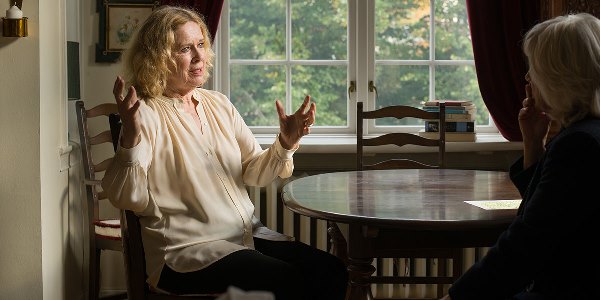
Liv Ullmann and Margarethe von Trotta in Searching for Ingmar Bergman (Börres Weiffenbach/Oscilloscope Laboratories)
It took just one Bergman film, The Seventh Seal, to awaken German filmmaker Margarethe von Trotta (Hannah Arendt) to her vocation. “This is where it all began for me, with a dark sky and a blackbird,” she says, referring to the aforementioned film’s opening scene, about her bond with Bergman’s films, one of her main artistic influences.
So her documentary Searching for Ingmar Bergman serves the purpose as an act of gratitude, not only for her but for anyone who has discover the unfathomable Bergman’s filmography. Considered one of the greatest film directors of all time, Bergman has a body of work full of authentic masterpieces (Wild Strawberries, Persona, Cries and Whispers), cryptic gems (Through a Glass Darkly, Hour of the Wolf), and fascinating rarities (From the Life of the Marionettes) that leave you breathless once you commit to exploring them. Just a few directors have been able to use cinema as a tool to dig deep into the innermost spaces of the human soul. His movies are also as close to poetry as movies can be. For film lovers, there’s something in them that brings about a devotion that’s almost religious.
To make a documentary about Bergman and his films might seem a ridiculous and pretentious task. It’s reasonable to say that it would be better to watch his films without intermediaries. Most likely von Trotta has considered this, which she silences in the first half hour of the film. She is best known for Marianne and Juliane (1981), the Golden Lion winner in Venice, made just a year before Bergman released his late masterpiece Fanny and Alexander (1982).
If you think her credentials are not enough to undertake this documentary, well, Bergman would think otherwise. Julianne and Marianne was listed by the Swedish director as one of his 11 favorite films of all time, alongside unquestionable classics such as Andrei Rublev, Rashomon, La Strada, Sunset Boulevard, and The Phantom Carriage (this last entry he considered the most influential movie to his work). She was the only female director on his list, and the only one who is still alive. This is mentioned by her not for her vanity but rather as a humble appreciation of discovering herself admired by someone she has revered her entire life. She has earned the right to make this film.
Searching for Ingmar Bergman avoids the mistake of exploring Bergman’s profile as a strict biography in which events in his life explain secret motivations behind his work. Von Trotta is not looking for Rosebud here. There are plenty of small anecdotes about Bergman, from the very mundane (he watched the TV soap opera Dallas) to the most intimate (the obsession on preserving the memory of his infancy). Some crucial facts are mentioned (the self-exile from Sweden after scandalous and humiliating tax evasion accusations), and his adult sons provide insight about him as an imperfect father.
Most of the testimonies come from filmmakers of different ages and countries: Olivier Assayas, Ruben Ostlund, Carlos Saura, and von Trotta. And of course, she shares a conversation with one of the most recognizable actresses in Bergman’s films: Liv Ullmann. Thanks to the selected interviews, the film never strays from its main focus: a meditation on Bergman’s films, as opposed a bloated analysis of their meanings. It’s a quiet navigation to contemplate the landscape of his magnificent work with all its transcendent images and themes.
According to this portrait here, Bergman was an unpretentious and sometimes insecure artist. He doesn’t fit with the archetypal big-ego figure associated with many great filmmakers. Just a simple man with a vast talent capable of demonstrating that movies can be a form of intellectual and spiritual expression as valid as the work of his playwright idols (August Strindberg and Henry Ibsen), even if he believed he had never reached their level.
The film fulfills its purpose, to attract the attention of anyone who hasn’t taken the time yet to appreciate Bergman’s films, and it also works for his cult followers as a fresh acknowledgment of the man apart from the often unbearable pretensions associated with his filmography. If nothing else, Searching for Ingmar Bergman is a splendid footnote about someone who made unparalleled films that feed our soul.
















Guillermo, lovely piece of critique. After reading you, I just can’t wait to watch the documentary.